Permaculture Jobs, Responsible Living
and Endless Travel
Abroad
How Vagabonders' Dreams Can Become
Reality
Article by Jonathon Engels,
photos by Emma Gallagher
Published 9/1/2015. Updated by Transitions Abroad 9/30/2023
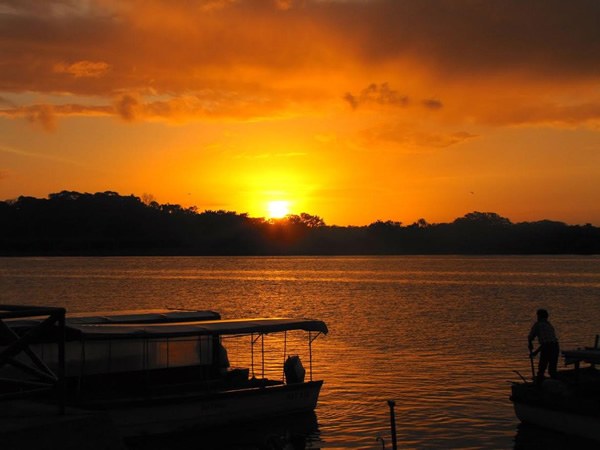
|
|
The boat border
crossing between Nicaragua and Costa Rica. After an
overnight ferry on Lake Nicaragua, we enjoyed the sunrise while waiting for the immigration
office to open. (Photo courtesy of Emma Gallagher.)
|
In the past two decades, the world has been opening up to unique opportunities through farm-stay work exchanges. As interest in healthier lifestyles, homegrown food, and international living has surged, forward-thinking individuals have invested in properties abroad to disconnect from conventional living, explore self-sustainability, and embrace eco-friendly living. Consequently, these environmentally conscious property owners seek assistance from like-minded travelers willing to work on their farms in exchange for room and board in a natural setting. This arrangement, offering affordable lodging in return for labor, proves to be a mutually beneficial arrangement for all parties involved and, most significantly, a boon for our planet when it is most needed.
In the past, long-term travelers and adventurers often spent a few weeks engaged in seasonal work on large farms, such as fruit or vegetable picking, to earn modest yet valued wages. This work, while sometimes physically demanding and repetitive, served as a means to sustain their travels and experience different parts of the world. However, seasonal farm work was more readily available in affluent regions like Europe, Australasia, and North America, often requiring specialized work-travel visas. Unfortunately, citizens from certain countries were ineligible for many of these opportunities, as some governments did not engage in reciprocal working relationships with other nations.
To address this challenge and streamline the process, online volunteering organizations like WWOOF, HelpX, and WorkAway have flourished in recent years. Savvy travelers have discovered innovative ways to sustain their long-term journeys without depleting their savings or navigating the complexities of obtaining work visas. Simultaneously, property owners have learned how to find and retain enthusiastic farm workers without straining their finances or transforming their ventures into formal businesses. After a period of 18 months
exploring the world through farm-stay arrangements, I’m
going to tell you how I’ve done it, and why the experience
has been far better than expected.
Where to Begin? Where to End?
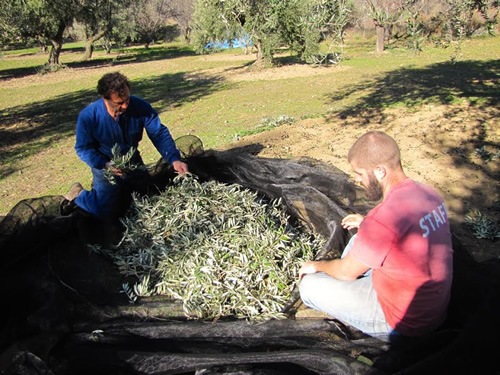
|
|
One of our most cherished experiences in Andalusia, Spain, was harvesting olives just outside of Grenada. This region boasts breathtaking scenery and an abundance of crops like olives, almonds, citrus fruits, and figs. The olive harvest season takes place in December and January.
(Photo courtesy of Emma Gallagher.)
|
My wife, Emma, and I had been living abroad for about 10 years, mainly working as English teachers. Around the middle of 2013, we felt a desire for a change of pace. We yearned for an extended backpacking trip but lacked the necessary funds, having earned a modest income in Guatemala. Both of us were intrigued by the
slow food movement and had dreams of growing our own vegetables someday. So, we decided to take a chance, embark on a journey across Central and South America, and immerse ourselves in organic gardening by volunteering along the way. We began our journey in October.
Our adventure had no fixed schedule, aside from visiting Emma's family sometime the following summer. We had a loose itinerary, with the ultimate goal of reaching Patagonia. We also had a backup plan: if we ran out of money, we would find teaching jobs wherever we happened to be. As it turned out, none of those scenarios unfolded. Instead, our experience became a delightful series of unexpected twists and turns that eventually led us to a caravan on a mountain in Andalusia, Spain, before returning to Guatemala.
In essence, there are countless starting points, with virtually every country on the map offering opportunities. In most cases, except for regions with severe winters, the timing isn't critical. Farms and gardens always have tasks to be done. Similarly, people worldwide are pursuing sustainable lifestyles, renewable energy sources, and ecologically responsible systems. As for where it all concludes, we've discovered that it's a matter of where we choose to stop. It could have just as easily been in Andalusia, where we received numerous offers for long-term living arrangements.
-
The initial step is finding a farm or site that's willing to host you, and these opportunities can be discovered in nearly any location you desire. Joining a work exchange platform, like WWOOF, HelpX, or WorkAway, often requires a small membership fee. Once you're a member, you can begin sending out requests to potential hosts. When my wife and I planned our journey, we meticulously arranged our visits from one farm to another as we explored different countries. You can create a structured itinerary, but I'd recommend setting up your next destination while you're still at your current location. This approach allows for more flexibility and the freedom to adapt to unexpected opportunities.
Knowing Little to Nothing
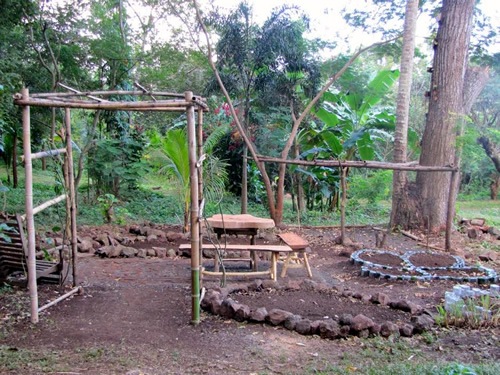
|
|
Totoco Farm on Ometepe Island
in Nicaragua. The first garden Emma and I designed.
The owner wanted to catch and utilize filtered gray
water, so we came up with this growing space and even
built the table and benches out of found wood.
|
Interestingly, many potential adventurers, whether they're considering volunteering on farms or teaching English abroad, often worry that they lack some essential skill required for the job. The truth is, you usually don't need to speak the local language to teach English in Korea or most other places. Similarly, when it comes to volunteering on farms, you typically don't need extensive knowledge about farming, gardening, or construction. What hosts are genuinely seeking, as the WWOOF (Willing Workers on Organic Farms) acronym implies, are individuals who are willing to put in the effort. The required skills are not too difficult to acquire.
Furthermore, the more a volunteer learns, the more valuable they become. When my wife and I started, we had limited knowledge. I had some experience helping a friend harvest avocados, and I had volunteered on an organic farm nearby, mainly doing weeding, the previous year. We both dabbled in planting a few things here and there but nothing too serious. We had basic skills like using a hammer and taking measurements. However, our primary qualities were a love for working outdoors, a willingness to try new things, and a strong desire to learn.
And learn we did. Within just a few weeks, especially with hands-on practice, we absorbed a wealth of specialized knowledge. We quickly grasped details like which plants thrived in specific sun conditions and how to harvest leaves from tropical plants for our daily salads. We mastered the art of creating various types of compost depending on our goals, whether it was for a compost water heater, a hot pile, a cool pile, or a no-turn pile. We became skilled in constructing different types of garden beds, working with cob, and forming garden guilds. Our expertise grew rapidly, and we felt more knowledgeable than our years might suggest.
-
Get ahead of the game by doing a
little learning before you go, there are amazing free
resources online, including Permaculture
News, and YouTube!, where
a simple “permaculture” keyword search will lead you
to all sorts of lectures,
clips, and even courses.
Earning More than Your Keep
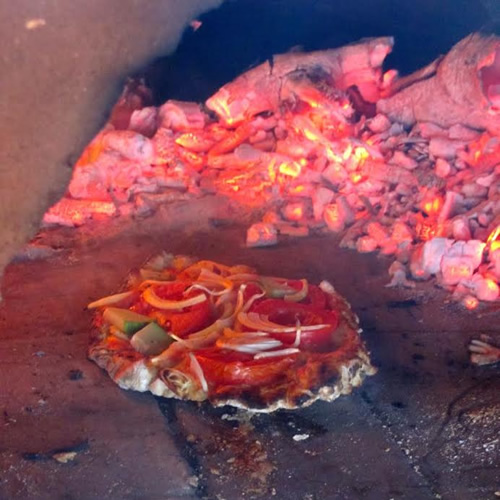
|
|
During our travels it was all
the rage to build huge earthen pizza ovens. We first
became familiar with the trend in Nicaragua, built
our first oven in Panama, helped to make one functional
in Colombia, and built a second in Spain. Nothing
says living it up like a pizza party.
|
It became clear to us that while hosts don't necessarily require volunteers to have specific skills, they highly value those who do. During our long journey, the knowledge we accumulated became a valuable asset at each new location. Typically, volunteers come and go, providing a week or month of unskilled labor. They learn the basics and then leave, while farmers continuously welcome new helpers, often spending more time teaching and guiding volunteers than working on their own land.
Right from our first farm, Emma and I realized we had two advantages: we had a flexible schedule and had dedicated ourselves to learning about sustainable farming and living. Our flexibility meant hosts saw the potential for long-term workers, which provided stability and significant progress for their projects. Consequently, our thirst for knowledge often led to us knowing more about the work than even the hosts themselves, many of whom were beginners.
Within about two weeks, we started receiving job offers. Hosts began offering additional benefits, waiving fees, and even providing small salaries. Unintentionally, we began receiving special treatment, such as better accommodations, personal projects, and creative freedom if we stayed longer. What began as a tentative way to travel long-term turned into a reliable opportunity. To date, we've been offered jobs at more properties than we've actually volunteered at, and we've never actively sought a position at any of them!
-
We've discovered that taking on miscellaneous jobs during our journey has been incredibly beneficial. While our gardening skills have led to paid work, we've also diversified our income through various short-term or part-time gigs, including freelance writing, teaching, and selling handmade crafts.
Permaculture and Responsible Living
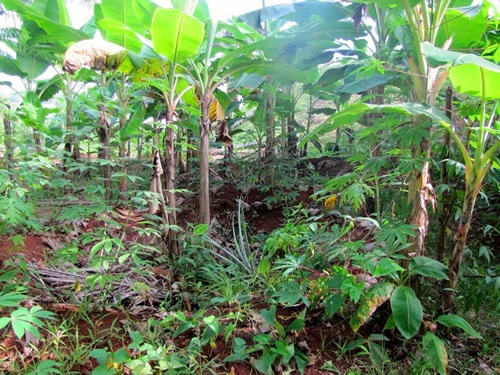
|
|
Permaculture is essentially a form of "permanent agriculture" that eliminates the need for frequent tilling, weeding, and replanting. Consequently, permaculture sites often feature food forests composed of perennial plants. In Panama, we initiated one such food forest, which eventually yielded more than 70 different varieties of edible plants.
|
Throughout our journey, permaculture profoundly impacted our lifestyle, travel choices, and future outlook. Among the individuals and communities we encountered, permaculture was a recurring topic of discussion. It was a term on everyone's lips, and many aspired to practice it, although there wasn't always a clear consensus on its exact meaning. Some associated it with raised beds, others with aquaponics, companion planting, or rainwater harvesting. This diversity of interpretations made it evident that a unified definition of permaculture remained elusive.
The interest and enthusiasm, although somewhat unclear, were undeniably infectious. Emma and I soon found ourselves devoting our free time to studying textbooks, browsing websites, and watching documentaries about permaculture. We realized that permaculture encompassed more than what we had witnessed people practicing thus far. It was a versatile concept, open to incorporating any system that benefited the planet, provided sustainable food and shelter, and promoted equitable resource-sharing rather than elitist hoarding. This discovery was eye-opening for us, as we had unwittingly embraced permaculture principles.
As our understanding of permaculture deepened, we gained the ability to discuss it knowledgeably. We could explain how the garden beds we installed functioned, why they were suitable for specific climates, and how to maintain them efficiently and economically. We grasped the intricacies of water catchment systems, from using gray water to storing rainwater for sustainable household use. We effortlessly used specialized terms like "hugelkultur," "swale," and "sheet mulching," which earned us respect and appreciation from our hosts and their friends.
Within a month or two of volunteering with people, they recognized our potential and believed in what we could achieve. It seemed that wherever we went, hosts wanted us to stay. Traveling as "volunteers" became a sustainable way for us to continue our adventures, living and eating for free on the lands we cared for (typical volunteer arrangements). Moreover, we started earning money through our newfound knowledge, often enough to cover our next journey's expenses. This way of traveling not only became sustainable but also improved our financial situation over time.
Journey from Point A to Uncharted Destinations

|
|
We were fortunate to enjoy breathtaking views, captivating sunsets, and mesmerizing sunrises over Lake Gatun during our time managing a site in Panama. We gladly accepted the opportunity to reside in a cozy lakeside cottage known as 'the Bahia,' which featured a spacious patio extending almost to the water's edge, and we relished this experience for nearly seven months
|
Our journey took an unexpected turn as we moved from Point A in Guatemala to Nicaragua, where we found ourselves embracing new possibilities and extending our stay by a month. Originally, our goal was to reach Patagonia, but by the time we reached Panama, our plans had transformed into something far beyond our initial ambitions. We craved the freedom to seize opportunities as they arose, and little did we know how many opportunities we would encounter.
In Panama, we took a complete detour from our original plans. We became the caretakers of a property owned by retirees who wanted to make their vacation home more eco-friendly. We also opened our doors to volunteers through HelpX and WorkAway, who joined us in developing the site. This experience taught us that our style of adventure was far from unique. Within a few weeks of seeking volunteers, we received more interest than we could accommodate, with reservations stretching out for the next three months.
Today, many people are traveling in similar ways. They spend their summer breaks exploring different farms across continents, take gap years to delve into sustainable lifestyles, intern on farms to gain unique experiences, and stumble upon unconventional job opportunities. Some even enroll in permaculture courses in remote locations or search for land to call their own. The opportunities are as diverse as the world itself, and this kind of adventure is accessible to anyone willing to embrace it.
Here are three tips to get a head start on your trip:
-
Free Up Your Schedule: Give yourself the freedom to spend as much time as you want on your journey. This flexibility can also impress hosts and increase your chances of longer stays, a benefit we discovered along the way.
-
Acquire Useful Skills: Prior to your travels, learn the basics of gardening, sustainable energy systems, and ecological construction. You can gain knowledge through online resources or by volunteering. Being immediately helpful makes you more appealing to hosts and can even lead to paid opportunities.
-
Secure Basic Funding: Have a plan for some income beyond your savings. Consider activities like writing or crafting to generate income on the road. I write. Emma sells crafts that she makes. Being a qualified English as a Foreign Language (EFL) teacher is a valuable backup plan that doesn't require extensive preparation. While you don't need to earn a substantial amount, having some income can significantly enhance your travel experience.
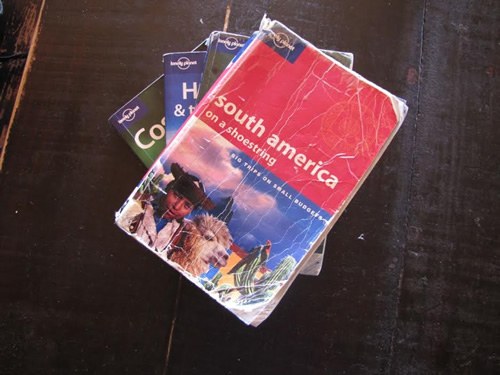
|
|
Certainly, this adventure has made us rely less on guidebooks for our travels. When we reached Spain in January, we had no predetermined destinations or plans. We discovered that the relationships we built on farms provided more reliable and intimate insights into where to go and what to explore.
|
|
Our Trip Timeline
-
November-December
2013: While on Ometepe Island in Nicaragua, after demonstrating our initiative by building, gardening, and using our basic Spanish skills for about a week, the owner requested that we extend our stay. Although he needed to return to Europe, he asked us to look after the farm and the adjacent hotel for a few weeks. During this time, we resided in his eco-friendly house, tending to the garden and spending time with farm volunteers, local staff, and lodge guests.
-
Christmas
Week 2013: Costa Rica, compared to other destinations in Central America, tends to be more expensive. Therefore, we opted for a brief visit. We spent a week working on a small farm owned by a couple in their early twenties, which covered a couple of acres. The experience was enjoyable, and we gained some knowledge about foraging. During the afternoons, we would take walks to the beach to cool off in the Caribbean waters. Once the week was over, we were content to continue our journey.
-
January-February
2014: We found ourselves at the summer home of a retired Canadian couple. They had a desire to cultivate organic vegetables but lacked the knowledge to do so. Leveraging what we had learned during our journey, Emma and I assisted them in getting started. They were enthusiastic about the farming techniques we shared and invited us to stay for six months to establish a volunteer program and enhance their property. We agreed, with the condition that we could take a two-month trip to South America before commencing our work.
-
February-March
2014: A farm-stay near Bogota marked a significant turning point for us. While we had heard about permaculture during our travels, La Juanita Finch Verde was actively implementing it with a comprehensive and flexible design. Our understanding of garden systems expanded significantly during the month we spent there. We were eager to return to Panama and apply these new concepts.
-
April
2014: In Ecuador, we collaborated with an NGO focused on farming, reforestation, and ecotourism development in the cloud forests. We had the opportunity to stay with a local family by paying a small fee directly to our hosts. During our time there, we created a garden, planted trees, contributed to a bird-spotting trail in the jungle, crafted jewelry from local seeds, and immersed ourselves in the rural life of Las Tolas, Ecuador.
-
April
2014-October 2014: In Panama, we dedicated six months to various gardening endeavors. We received a modest cash stipend while focusing on exploring different gardening techniques, establishing food forests, constructing innovative garden beds, and initiating a communal garden. During this time, we welcomed volunteers from seven different countries who joined us in our efforts, and our daily meals were sourced from our own produce. Although we had the opportunity to extend our stay, we decided it was time to resume our journey.
-
October
2014-December 2014: A family emergency in England, which is Emma's home country, abruptly interrupted our South American journey. Within a day of returning to Colombia, we had booked a flight to Manchester. We ended up staying in England for three months. On a positive note, our time there allowed us to explore several permaculture sites.
-
January
2015-March 2015: Instead of immediately returning to Latin America, we spent three months in Spain. During this time, we participated in olive harvesting, revitalized a neglected permaculture site that had been abandoned for four years, improved an eco-property with the sustainable agricultural knowledge we had acquired, and even constructed a cob pizza oven (our second one).
-
March
31, 2015: We are returning to Guatemala, a place we now consider "home," with the intention of finding our own piece of land. Our plans include building a cob house, powering the site with renewable energy sources, and cultivating our own food. We look forward to welcoming volunteers to assist us with these projects and collaborating with local schools on community garden initiatives.
|

|
Jonathon
Engels earned an MFA in creative writing.
He has lived, worked and/or volunteered in seven
different countries, traveling his way through
nearly 40 countries between them. His many interests include permaculture, veganism, and ways to live sustainably.
|
|
